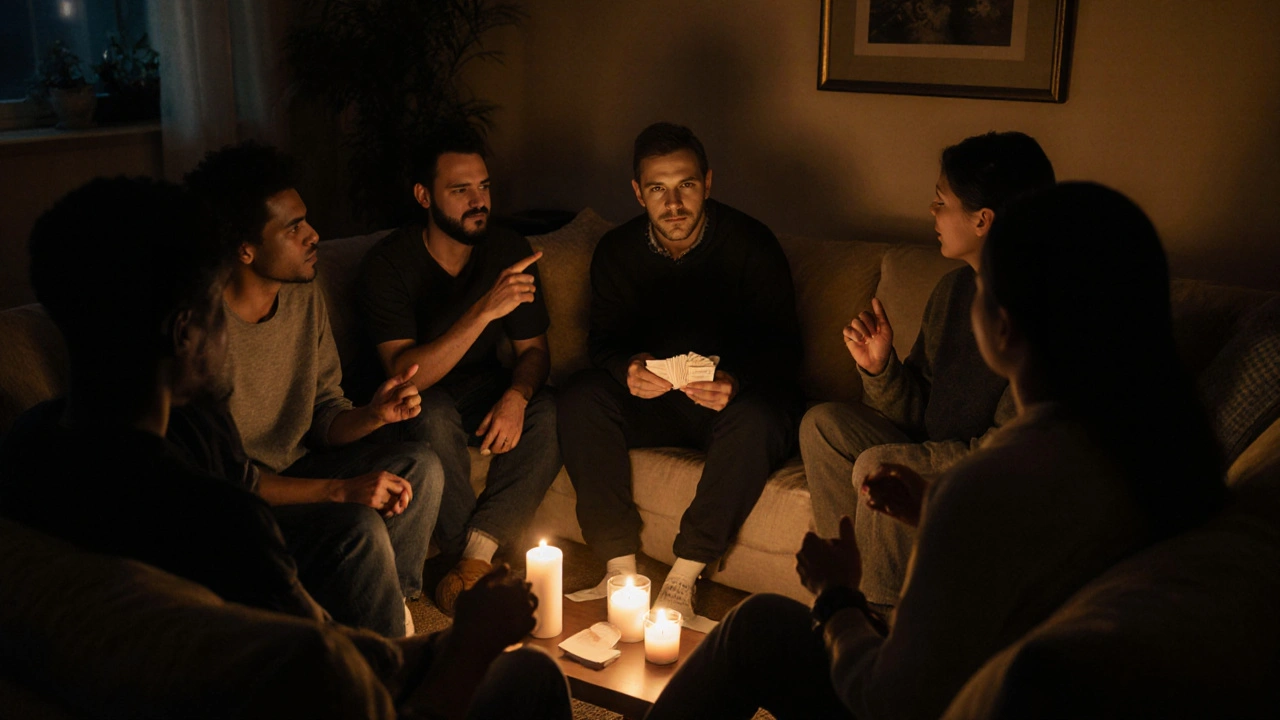Group sex isn’t just about who’s in the room-it’s about what’s being said, how it’s being said, and whether everyone feels safe enough to speak up. Too many people assume that if everyone is physically present and seems into it, then everything’s fine. But that’s where things go wrong. Real success in group sex doesn’t come from chemistry alone. It comes from communication.
What Really Makes Group Sex Work?
Think of group sex like a band playing together. You don’t just need talented musicians-you need people who listen to each other, know when to step back, and when to lead. One person playing too loud, another staying silent, or someone missing a cue? The whole thing falls apart. The same goes for group sex. Physical attraction gets you in the door. Clear, ongoing communication keeps it going-and keeps everyone safe.
You might be wondering, ‘Can’t we just read the room?’ The answer is no. Bodies don’t always signal what’s happening inside. Someone might be smiling because they’re nervous. Someone else might stay quiet because they don’t want to be seen as ‘difficult.’ That’s why you can’t rely on vibes alone. You need words.
Why Communication Isn’t Optional
Without communication, group sex becomes a minefield of assumptions. ‘They seemed into it’ isn’t a defense. ‘I thought they wanted that’ doesn’t protect anyone. Consent isn’t a one-time nod at the start-it’s a continuous conversation.
Studies from the Journal of Sexual Medicine show that 68% of negative experiences in group sexual settings stem from unclear boundaries or unspoken expectations. That’s not a small number. That’s two out of every three people who walk away feeling uncomfortable, confused, or even violated-not because someone was malicious, but because no one talked about what they actually wanted.
Communication isn’t about being awkward. It’s about being respectful. It’s about asking: ‘Is this okay?’ ‘Do you want to keep going?’ ‘Can we slow down?’ ‘What do you like?’ These aren’t mood killers. They’re the foundation of trust.
How to Start the Conversation
Most people avoid talking about sex because they fear rejection or embarrassment. But the truth? People appreciate honesty more than they fear awkwardness.
Here’s how to make it easier:
- Have a pre-game chat-before anyone gets undressed. Ask: ‘What are you hoping for tonight?’ ‘What are your limits?’ ‘Is there anything you absolutely don’t want?’
- Use clear, simple language. Say ‘I don’t want to do X’ instead of ‘I’m not sure about X.’ Ambiguity invites confusion.
- Agree on a safe word. Not just ‘no’-something that stands out, like ‘red’ or ‘pineapple.’ This gives everyone a way to pause without shame.
- Check in during. A quick ‘You good?’ or a hand on the shoulder can mean more than you think.
- Debrief afterward. ‘How did that feel for you?’ This builds trust for next time.
It doesn’t have to be a formal meeting. A quiet moment over coffee, a text before meeting up, or even a quick whisper in the dark-it all counts.

Common Communication Pitfalls
Even when people mean well, they mess up. Here are the most common mistakes:
- Assuming silence means consent. Silence is not yes. It’s often fear, shock, or overwhelm.
- Using alcohol or drugs to lower inhibitions. That doesn’t make communication easier-it makes it impossible. Consent under the influence isn’t valid.
- Trying to ‘read’ body language too much. A moan doesn’t mean ‘more.’ A stiff body doesn’t mean ‘I’m into it.’ Only words tell you what someone truly wants.
- Letting one person dominate the conversation. If someone’s always calling the shots, others are likely staying quiet because they don’t feel safe speaking up.
- Ignoring nonverbal cues entirely. Communication isn’t just talking. It’s noticing when someone pulls away, stops breathing, or looks away. These are signals too.
The goal isn’t perfection. It’s awareness. If you notice someone’s not engaging, pause. Ask. Don’t assume.
Setting Boundaries That Actually Work
Boundaries aren’t about saying no to everything. They’re about saying yes to what you want-and protecting what you don’t.
Here’s how to set them clearly:
- Physical limits: ‘I’m okay with kissing, but not with penetration.’
- Emotional limits: ‘I’m not looking for anything after this.’
- Role limits: ‘I’m not into power play.’
- Group size limits: ‘I’m only comfortable with three people max.’
Write them down if you need to. Share them. Repeat them. No one gets to change the rules mid-game without asking.
And if someone crosses a boundary? Stop. Immediately. No questions. No explanations. Just pause, reset, and talk.
What Happens When Communication Fails
When communication breaks down, the fallout isn’t always obvious. Someone might leave quietly. Someone else might laugh it off. But the damage lingers.
People report feeling:
- Used or objectified
- Shameful for not speaking up
- Trapped because they didn’t know how to say no
- Disconnected from their own desires
That’s not sex. That’s trauma by omission.
Real group sex isn’t about how many people are involved. It’s about how deeply everyone is present. And presence starts with voice.

Communication Tools That Help
You don’t need to wing it. There are practical tools that make this easier:
- Consent cards: Small cards with checkmarks for ‘yes,’ ‘maybe,’ ‘no,’ and ‘stop.’ Hand them out before things get heated.
- Pre-arranged signals: A tap on the shoulder means ‘pause.’ Two taps mean ‘stop.’ A thumbs-up means ‘keep going.’
- Group chat before meeting: A simple group text where everyone lists their boundaries. No pressure to respond-just share.
- Aftercare rituals: A shared drink, a quiet walk, a hug. These aren’t fluffy-they’re emotional reset buttons.
These aren’t gimmicks. They’re safety nets.
Why This Matters Beyond the Bedroom
Learning to communicate in group sex isn’t just about sex. It’s about learning how to say what you need, how to hear others, and how to respect boundaries-even when it’s uncomfortable.
These skills carry over into relationships, friendships, even workplaces. The ability to say ‘I’m not okay with this’ without guilt? That’s power. The ability to ask ‘Are you sure?’ without judgment? That’s empathy.
Group sex, done right, isn’t about excess. It’s about connection. And connection requires honesty.
Final Thought: It’s Not About the Number
One person, two people, five-it doesn’t matter. What matters is whether everyone feels seen, heard, and safe.
Great group sex doesn’t happen because everyone is hot. It happens because everyone is honest.
So next time you’re thinking about joining a group encounter, ask yourself: ‘Am I ready to talk? Am I ready to listen?’ If the answer isn’t a clear yes, then wait. Better to wait than to regret.
Is group sex legal?
In most places, consensual group sex between adults is legal as long as no money changes hands and no one is coerced. Laws vary by country and even by city, so it’s important to know your local regulations. Always ensure all participants are of legal age and fully consenting.
How do I bring up communication without killing the mood?
You don’t have to ruin the mood-you just have to be smart about timing. Bring it up before things get physical. Say something like, ‘I really want us all to feel good tonight-can we quickly check in on what everyone’s okay with?’ Most people appreciate it. If someone gets annoyed, that’s a red flag. Real connection starts with respect, not just chemistry.
What if someone changes their mind during?
Stop immediately. Full stop. No arguing. No pressure. Just pause and say, ‘Okay, we’re stopping.’ Then check in privately if needed. Consent can be withdrawn at any time-even mid-act. That’s not a failure. That’s respect in action.
Can group sex be emotionally safe?
Yes-but only if everyone is intentional. Emotional safety comes from clear boundaries, honest communication, and mutual respect. Avoid group settings if you’re looking for romance or deep emotional bonds unless you’ve explicitly discussed expectations. Group sex is usually physical, not emotional. Know what you’re signing up for.
Do I need to have sex with everyone in the group?
Absolutely not. You only do what you want. No one gets to demand participation. You can watch, participate in part, or sit out entirely. Your comfort comes first. If someone pressures you, they’re not worth being around.
How do I find trustworthy people for group sex?
Start with people you already trust-friends, partners, or communities with shared values. Online groups can help, but vet carefully. Look for communities that emphasize consent, communication, and aftercare. Avoid anyone who avoids talking about boundaries. Trust isn’t built in the moment-it’s built over time.
What if I feel guilty afterward?
Guilt often comes from internalized shame, not from what actually happened. Ask yourself: Did everyone consent? Was there communication? Was there respect? If yes, then you did nothing wrong. If no, then it’s not guilt-it’s a signal. Use it to learn, not to punish yourself.








Gopal Ram
November 8, 2025 AT 16:25bro i just read this and i’m like… why is everyone acting like group sex is a team sport?? 🤡 i mean yeah communication is cool and all but like… if you’re gonna have group sex you already know the vibe, right? no need for consent cards and debriefs like it’s a fucking yoga retreat. just vibe, touch, moan, done. why are we overcomplicating sex now?? 🤦♂️
Mitchel Geisel
November 10, 2025 AT 10:24Wow. Just… wow. You took a perfectly reasonable, clinically sound article on consent and turned it into a manifesto for emotional labor in the bedroom. Let me get this straight: you’re saying that if I don’t ask my partner if they want to be fingered while someone else is sucking their dick, I’m a monster?
Let’s be real - the moment you start scripting sexual encounters like a corporate team-building exercise, you kill the spontaneity that makes it fun. Not everything needs a flowchart. Sometimes, trust and chemistry are enough. And no, I don’t need a pineapple code to know when someone’s uncomfortable - I can read a person. 🤷♂️
Praveen Lingareddy
November 12, 2025 AT 04:56THIS. THIS RIGHT HERE. I’ve been saying this for years. People think ‘consent’ means saying yes once and then it’s open season. NO. Consent is a living, breathing, fucking CONTRACT. I’ve been in groups where someone just… stopped moving. Smiled. Didn’t say a word. I knew. I KNEW they were terrified. And nobody noticed. Nobody.
That’s not chemistry. That’s exploitation wrapped in glitter. I once walked out of a group because someone said ‘you’re too quiet’ and kept going. That’s not sexy. That’s predatory.
And don’t even get me started on alcohol. If you’re drunk and ‘consenting,’ you’re not consenting - you’re a liability. The fact that this even needs to be said in 2025 is disgusting.
Emily S Hurricane
November 12, 2025 AT 10:51Pre-game chat + safe word = non-negotiable. Done. No debate.
Also: if someone says ‘I’m not sure about X,’ that means ‘no.’ Stop interpreting hesitation as ‘maybe.’ That’s not reading the room - that’s gaslighting.
ian haugh
November 13, 2025 AT 19:52Man, I love this post. I’m from Australia and we don’t talk about sex much here - it’s all ‘eh, it’s fine’ and awkward silence. But I tried this with my crew last month - sent a group text before meeting up: ‘What’s cool? What’s not?’ One guy said ‘no anal,’ another said ‘no kissing unless mutual.’ We all just nodded. No drama.
Turned out way better than I expected. Felt more connected than any one-on-one. Just… talked first. Wild, right?
Also, pineapple is the best safe word. I’m stealing that.
Jessica Kennedy
November 15, 2025 AT 15:33Okay but who’s actually doing this? Like… real people? Or is this just a bunch of therapists and woke college kids writing fantasy scenarios? I’ve been in three group scenes and not one person asked for a safe word. One girl cried afterward and said she ‘didn’t know how to say no.’ Guess what? That’s not your fault - it’s the culture that told you silence = consent.
And why is everyone acting like group sex is some sacred ritual? It’s sex. Sometimes messy. Sometimes awkward. Sometimes amazing. But if you need a 10-step checklist to have fun, maybe you’re not ready. Or maybe you’re just scared.
Also - consent cards? In the heat of the moment? Who’s gonna pull out a laminated card? 😂